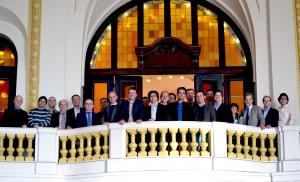Supporting and stimulating fusion education in Europe
18 Feb 2013
-
The FuseNet Team
Reviewing the project at the start of the meeting, the chair showed that basically all goals that had been set out at the beginning of the project have indeed been realized.
On February 5-6, 2013 the General Assembly of the FuseNet Association, the European Fusion Education Network, convened in the Rectorate building of the St. Clement of Ohrid University of Sofia, Bulgaria, where it was generously hosted by Prof. Evgenia Benova.
At the start of the meeting, FuseNet welcomed a wide representation of fusion institutes in Europe, including several new members that were present for the first time. In particular, FuseNet is proud to count the ITER Organization among its members.
This meeting took place at a pivotal moment in the existence of the Association. On the one hand it is a time of closure, as the principal grant of the Association, the FuseNet FP7 project, is coming to an end later this year. Reviewing the project at the start of the meeting, the chair showed that basically all goals that had been set out at the beginning of the project have indeed been realized.
Firstly, an effective education network was established, made sustainable by the FuseNet Association. Joint criteria were developed for the award of the Fusion Master and Fusion Doctorate Certificates, which serve to homogenize and enhance the level of fusion education in Europe.
Secondly, joint educational tools such as hands-on labs, web-based virtual tools, web-access to existing experiments and a web-based course on plasma physics were developed. Moreover, the production of a book on fusion technology was initiated and is presently in an advanced stage.
Thirdly, joint educational activities such as summer schools were supported and the annual event for PhD students—of which the 3rd edition will take place in York in June this year—was introduced.
Internships for students were also arranged and, more recently, matchmaking with industrial partners has been taken on. Finally, the project has had a singularly successful mobility scheme that has allowed students to take part in educational activities.
At the heart of FuseNet is the attractive website which provides transparent access to all educational activities in the field of fusion in Europe. Students have definitely found their way to this portal, with more than 100 visits per day.
The FuseNet Association is also growing in terms of its membership count. The board expressed its ambition to further extend FuseNet's representation of fusion institutes in Europe this year. With the shift from pure research to designing, building and operating facilities like ITER and DEMO in mind, FuseNet will also start welcoming industrial partners to join the Association and work closely together with industry to educate and train the students and engineers in skills for ITER operation.
FuseNet is now shifting into a new mode of operation. Based on membership fees, a limited set of core activities—including the website and the award of Master and Doctorate certificates—will be sustained. On top of this, FuseNet will apply, on behalf of all its members (presently over 30), for grants that will allow it to vigorously stimulate, coordinate and support fusion education and training in Europe.
For more information on membership of the Association, please refer to the FuseNet website.


